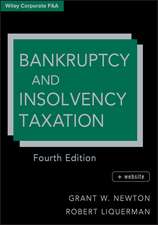Factors Influencing Individual Taxpayer Compliance Behaviour
Autor Ken Devosen Limba Engleză Hardback – 10 oct 2013
| Toate formatele și edițiile | Preț | Express |
|---|---|---|
| Paperback (1) | 643.99 lei 6-8 săpt. | |
| SPRINGER NETHERLANDS – 23 aug 2016 | 643.99 lei 6-8 săpt. | |
| Hardback (1) | 650.37 lei 6-8 săpt. | |
| SPRINGER NETHERLANDS – 10 oct 2013 | 650.37 lei 6-8 săpt. |
Preț: 650.37 lei
Preț vechi: 765.14 lei
-15% Nou
Puncte Express: 976
Preț estimativ în valută:
124.45€ • 133.08$ • 103.76£
124.45€ • 133.08$ • 103.76£
Carte tipărită la comandă
Livrare economică 18 aprilie-02 mai
Preluare comenzi: 021 569.72.76
Specificații
ISBN-13: 9789400774759
ISBN-10: 9400774753
Pagini: 368
Ilustrații: XXV, 342 p. 41 illus., 20 illus. in color.
Dimensiuni: 155 x 235 x 30 mm
Greutate: 0.69 kg
Ediția:2014
Editura: SPRINGER NETHERLANDS
Colecția Springer
Locul publicării:Dordrecht, Netherlands
ISBN-10: 9400774753
Pagini: 368
Ilustrații: XXV, 342 p. 41 illus., 20 illus. in color.
Dimensiuni: 155 x 235 x 30 mm
Greutate: 0.69 kg
Ediția:2014
Editura: SPRINGER NETHERLANDS
Colecția Springer
Locul publicării:Dordrecht, Netherlands
Public țintă
ResearchCuprins
Acknowledgments.- Table of Contents.- List of Appendices.- List of Figures.- List of Tables.- List of Acronyms.- Legislation.- 1 Introduction and Background.- 2 Tax Compliance Theory and the Literature.- 3 Extension of the Economic Deterrence Model.- 4 Theoretical Framework and Hypotheses Development.- 5 Quantitative Analysis of Research Findings - Evader Sample.- 6 Qualitative Analysis of Research Findings – Evader Sample.- 7 Quantitative Analysis of Research Findings - General Population Sample.- 8 Qualitative Analysis of Research Findings - General Population Sample.- 9 Further Statistical Testing and a Comparative Analysis of the Evader and General Population Samples.- 10 Conclusion.- Appendices.- Bibliography.- About the Author.
Textul de pe ultima copertă
This volume provides a comprehensive analysis of why taxpayers behave the way they do. It reveals the motivations for why some taxpayers comply with the law while others choose not to comply. Given the current global financial climate there is a need for governments worldwide to increase their revenue collections via improving taxpayer compliance. Research into what shapes and influences taxpayer behavior is critical in that any marginal improvement in understanding and dealing with this behavior can potentially have a dramatic impact upon government revenue. Based on Australian data derived from the data bases of the Australian Taxation Office as an example, this book presents findings that provide lessons for tax systems around the world. Regardless of the type of tax system in place, taxpayers of all nationalities are concerned about how their tax authorities deal with non-compliance and in particular how the tax authorities go about encouraging compliance and ensuring a fair tax system for all. The book presents empirical evidence concerning taxpayer compliance behavior with particular attention being drawn to the moral values of taxpayers, the perceived fairness of the tax system and the deterrent measures undertaken by revenue authorities which influence that behavior. Other issues examined include the degree to which tax penalties operate as an effective deterrent to curbing behavior and how taxpayers' level of general tax knowledge and awareness also impacts upon their actions.
Caracteristici
The first volume to reveal the views and experiences of individual tax evaders Provides an extensive review of the international tax compliance literature Adopts a mixed research methodology enhancing the validity and reliability of the results Includes findings that have implications for revenue authorities and policy makers worldwide? Includes supplementary material: sn.pub/extras










